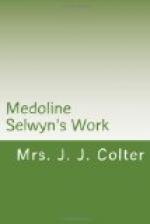“Well, here is the first instalment of widows’ money. I give it to you quarterly, purely from benevolent motives.”
“Why so?” I asked, curiously.
“If you received it all at once Mill Road would be resplendent with crape and cheap jewelry.”
“I suppose I must thank you,” I said, hotly; “but the manner of the giving takes away all the grace of the gift.”
“You express yourself a trifle obscurely, but I think I comprehend your meaning,” he said, without change of voice. If I could have seen his eyes flash, or his imperturbable calm disturbed, my own anger would have been less keen.
“May I go now?” I presently asked, quite subdued; for he had fallen into a brown study, and was still holding my hand.
“Yes, I had forgotten,” he said, turning away, and a moment after entered the library and shut the door. I went in search of Mrs. Flaxman, whom I found still in the breakfast-room, and in a rather nervous condition, busy about the china, which she rarely permitted the servant to wash.
“Shall we stay long in New York?” I asked, very cheerfully, the fifty dollars I held in my hand, and the easy way I had got off with Mr. Winthrop, making me quite elated.
“One can never tell. Mr. Winthrop is very uncertain; we may return in a day or two, or we may stay a fortnight.”
“You are not anxious to go?” I questioned, seeing her troubled face.
“Not just now, in the height of the pickling and preserving season. Reynolds has excellent judgment, but I prefer looking after such things myself.”
She looked wistfully at me while she dried her china. “May I help you, Mrs. Flaxman? It never occurred to me before that I might share your burdens. I should learn to have cares, as well as others.”
“I always like to have you with me, dear. Sometimes I try to make myself believe God has given you to me, instead of my own little Medoline.”
“Had you a daughter once?”
“Yes; and, like yourself, named after your own dear mother.”
“Oh, Mrs. Flaxman, and you never told me. Was she grown up like me?”
“She was only six years old when she died, just a month after her father; but the greater grief benumbed me so I scarce realized my second loss until months afterward.”
“Is it so terrible, then, to lose one’s husband?”
“It depends greatly on the husband.”
“The widow Larkum cries constantly after hers, but he was bread-winner, too. A hungry grief must be a double one.”
“Did Mr. Winthrop say anything further to you about being out last night?”
“A little,” I replied, with scarlet cheeks; “but he will never do so again. I shall not give him cause to reprove me.”
“That is the most lady-like course. You are no longer a little girl, or a school-girl either.”
I wiped my plates in silence, but my mortification was none the less intense. I realized then, more keenly than ever, that I must preserve the proprieties, and confine myself to the restrictions of polite society. The breezy, unconventional freedom Mrs. Flaxman had for those few months permitted me had been so keenly enjoyed. I fretted uneasily at the forms, and ceremonies of artificial life, while the aboriginal instincts, which every free heart hides away somewhere in its depths, had been permitted too full development.




